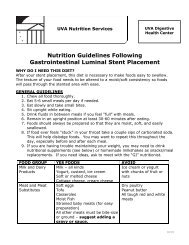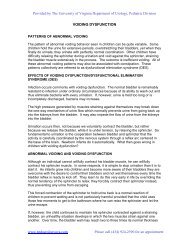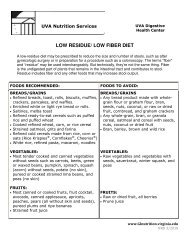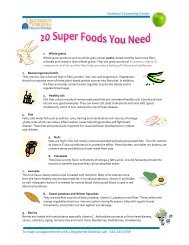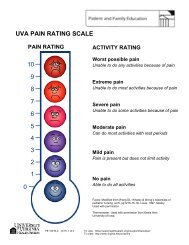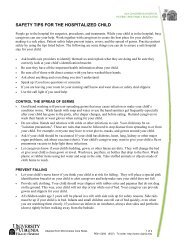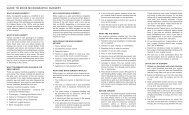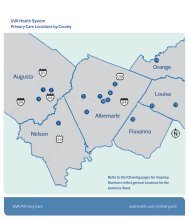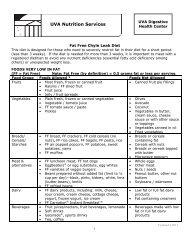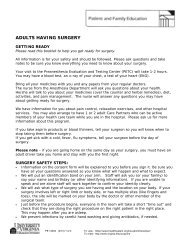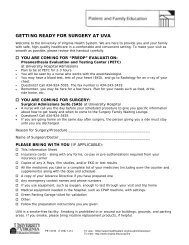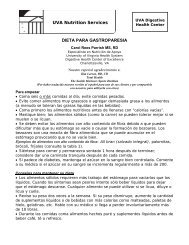Irritable Bowel Syndrome (IBS) - Nutrition Considerations
Irritable Bowel Syndrome (IBS) - Nutrition Considerations
Irritable Bowel Syndrome (IBS) - Nutrition Considerations
Create successful ePaper yourself
Turn your PDF publications into a flip-book with our unique Google optimized e-Paper software.
<strong>Irritable</strong> <strong>Bowel</strong> <strong>Syndrome</strong> (<strong>IBS</strong>) - <strong>Nutrition</strong> <strong>Considerations</strong><br />
<strong>Irritable</strong> bowel syndrome (<strong>IBS</strong>) is defined as abdominal discomfort associated with<br />
altered bowel habits such as constipation, diarrhea, bloating, or urgency.<br />
♦ <strong>IBS</strong> is the most common disorder diagnosed by gastroenterologists, as well as the most<br />
common disorder seen by primary care physicians. It is estimated that approximately 10-<br />
15% of the world’s population has <strong>IBS</strong>.<br />
♦ There is no known cure for <strong>IBS</strong>. However, individuals may find relief with treatments<br />
specific to their symptoms.<br />
♦ Symptoms vary from person to person. Each individual experiences different symptoms<br />
and tolerates different foods.<br />
♦ Food allergies (symptoms caused by an immune response) are rarely the culprit in<br />
<strong>IBS</strong> patients. Most <strong>IBS</strong> patients with food-related symptoms have food sensitivities or<br />
intolerances, which are not caused by an immune response.<br />
♦ A few individuals with <strong>IBS</strong> symptoms may have specific food-related conditions including<br />
lactose intolerance and celiac disease.<br />
♦ Keeping a food journal will help you to log the foods you do not tolerate, and the symptoms<br />
you experience.<br />
♦ Life stressors, such as employment changes, travel, relocation, uncomfortable social<br />
situations, or illness can trigger or worsen symptoms.<br />
♦ A number of other factors may also worsen symptoms, such as excessive use of laxatives or<br />
antidiarrheal drugs, lack of regular sleep, and inadequate fluid intake.<br />
The suggestions below have been helpful in some individuals to alleviate <strong>IBS</strong> symptoms.<br />
To determine what does and does not work for you, make only one change at a time.<br />
Diet Suggestions for <strong>IBS</strong>:<br />
UVA <strong>Nutrition</strong> Services<br />
• Try smaller, more frequent meals<br />
UVA Digestive<br />
Health Center<br />
• High-fat, greasy, rich foods are typically not as well tolerated. Try eating a<br />
lower-fat diet. Some easy ways to reduce fat intake include:<br />
o Select lean meats (fish, turkey, chicken) - bake or grill.<br />
o Choose fat low-fat or non-fat dairy products (milk, soymilk, yogurt, cheese)<br />
o Cook with cooking spray, instead of butter or vegetable oil.<br />
NRD 6/2010
• Try a reduced lactose diet. Lactose is found in certain dairy products. If<br />
symptoms improve and you plan on continuing this diet long term, it is very<br />
important to get calcium and vitamin D from other food sources or supplements<br />
including naturally low lactose dairy products. These include low or fat free yogurt,<br />
as well as hard cheeses (however these have a higher fat content). The fat in<br />
some dairy products rather than lactose can also be a factor contributing to <strong>IBS</strong><br />
symptoms.<br />
• Try reducing the amount of highly gas producing foods and less readily<br />
absorbed natural sugars in your diet. Some individuals feel benefit from a low<br />
FODMAP (Fermentable Oligo- Di and Mono-saccharides and Polyols) diet (see<br />
FODMAP handout for more details). Some groups of foods that you may try<br />
excluding are:<br />
o Apples, pears, oranges, pineapples, melons (high fructose)<br />
o Onions, leeks, asparagus, artichokes (vegetables containing fructans)<br />
o Wheat-based products<br />
o Sugar alcohols (such as sorbitol or mannitol). They are used in many sugarfree<br />
gums, candy, and medicine (unfortunately, it is not always listed on the<br />
medicine label, so you will have to ask your pharmacist).<br />
o Legumes, lentils, cabbage, brussel sprouts (contain raffinose)<br />
• For some individuals, certain foods, such as caffeine (coffee, tea, soda), chocolate,<br />
and alcohol, may trigger <strong>IBS</strong> symptoms.<br />
• Foods and supplements containing soluble fibers are better tolerated than the<br />
insoluble ones (see table on next page for foods rich in soluble fiber). Slowly<br />
adding soluble fiber to your diet may alleviate some of your symptoms –<br />
Remember to drink plenty of fluids as you gradually increase the fiber content of<br />
your diet.<br />
Alternative Therapies and <strong>IBS</strong>:<br />
Alternative therapies, such as probiotics and herbal supplements, are sometimes used<br />
by patients with <strong>IBS</strong>. Kefir and certain yogurts contain natural probiotics. Below is a list<br />
of herbal and natural therapies that have been studied. Discuss any supplements you<br />
are taking with your physician and dietitian.<br />
• Peppermint oil — there is some evidence supporting a benefit for peppermint oil.<br />
Some studies have shown improvement of symptoms with enteric coated<br />
peppermint oil capsules (0.2-0.4ml per capsule in doses of 3-6 capsules daily).<br />
Peppermint oil may cause or worsen heartburn in some.<br />
• Probiotics — there is increasing interest in the possible beneficial effects of so<br />
called "healthy" bacteria in a variety of intestinal diseases including <strong>IBS</strong>. Whether<br />
supplements containing these bacteria (such as acidophilus with or without fructooligosaccharides<br />
“FOS” or Lactobacillus) are of any benefit is unproven.<br />
• Chamomile tea —Chamomile tea is of unproven benefit in <strong>IBS</strong>.<br />
NRD 6/2010
• Evening primrose oil — Evening primrose oil, a supplement containing gamma<br />
linolenic acid, is of unproven benefit.<br />
• Fennel seeds — Fennel seeds are of unproven benefit.<br />
• Wormwood — Wormwood is of unproven benefit and may be unsafe. Wormwood<br />
oil can cause damage to the nervous system.<br />
• Comfrey — Comfrey is of unproven benefit and can cause serious liver problems.<br />
Additional Resources:<br />
♦ Other resources available at the University of Virginia Health System, GI <strong>Nutrition</strong><br />
website (www.GInutrition.virginia.edu):<br />
o FODMAP Diet (low fructose and poorly digested carbohydrates) Handout<br />
o Reduced Lactose Handout<br />
o Clinical ramifications of fructose malabsorption of fructose and other shortchain<br />
carbohydrates (Practical Gastroenterology series)<br />
o Association Providing Support for Patients with Digestive Diseases<br />
♦ International Foundation for Functional Gastrointestinal Disorders (IFFGD) Inc:<br />
www.iffgd.org<br />
♦ <strong>IBS</strong> Self Help and Support Group: www.ibsgroup.org<br />
♦ National Institute of Diabetes & Digestion & Kidney Diseases: www.niddk.nih.gov<br />
Foods Rich in Soluble Fiber<br />
Food Amount Soluble<br />
Fiber<br />
(grams)<br />
Vegetables<br />
Asparagus 2/3 cup 2<br />
Baked potato with skin 1 small 1<br />
Broccoli/carrots ½ cup 1<br />
Collard greens 1 cup 3<br />
Green beans ½ cup 1<br />
Sweet peas ½ cup 1.5<br />
Sweet potato with skin 1 small 1.5<br />
Fruits<br />
Mango ½ small 1.7<br />
Apricots, dried 7 halves 1.1<br />
Apricots, fresh 1 small 1<br />
Banana 1 medium 1<br />
Grapefruit ½<br />
medium<br />
Nectarine 1 medium 1<br />
Orange/pear/tangerine 1 medium 2<br />
Peach/Plum 1 medium 1<br />
1<br />
Food Amount Soluble<br />
Fiber<br />
(grams)<br />
Legumes<br />
Lima beans 1 cup 3<br />
Garbanzo<br />
beans<br />
½ cup 1<br />
Grains<br />
Brown rice ½ cup 0.4<br />
Cheerios 1 cup 1<br />
Oatmeal<br />
(dry)<br />
Oatmeal<br />
(instant)<br />
1/3 cup 2<br />
1 packet 1.5<br />
Raisin bran 1 cup 1.3<br />
Wholewheat<br />
bread<br />
White<br />
bread<br />
1 slice 0.4<br />
1 slice 0.2<br />
NRD 6/2010




